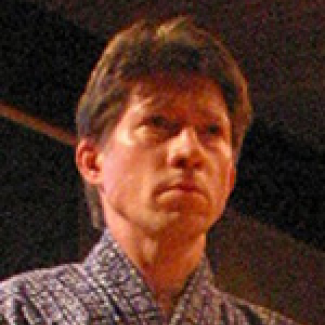Gary Mathews

Emeritus
Department of Foreign Languages and Literatures
Withers Hall NA
919-515-9306 glmathew@ncsu.eduBio
My interests lie at the intersection between academic research and teaching and theatrical performance. I taught for twelve years at the University of North Carolina School of the Arts before coming to NC State six years ago. After many years of ballet training, I began study of Classical Japanese noh theatre performance twenty years ago. I am a founding member of Theatre Nohgaku, a professional company dedicated to creating and performing original English language plays in fully traditional noh style. My research is concerned with the social role of the performing arts, with a focus on noh and Greek tragedy. My teaching at State covers Greek and Latin language, literature and culture. It is always my foremost goal to lead students to see cultural practices of all kinds as ways a society produces and acts out images of itself for purposes of self-examination as well as diversion and pleasure.
Projects
My research is currently focused on the following:
1) A study of the relationship between training and performance in Japanese noh theatre. Training is always from the beginning grounded in actual performance of the repertory (unlike Western ballet where training is grounded in technique and only after considerable time does the student learn repertory). The result is a special kind of “naturalism” in performance, where the story is not grafted onto a separable technique, but always grows organically out of the technique.
2) A comparative study of the drama theory of Zeami and Aristotle. My main concern here is with the social functions of noh and Greek tragedy, as reflected in the ways of approaching and discussing the two art forms by their leading theoreticians.
3) A study of acting style in ancient Greek tragedy. My thesis is that acting styles were probably far more realistic than is generally supposed. This becomes evident not only when tragedy is considered alongside the highly formalized performance style of Japanese noh, but also when we take into account tragedy’s associations with other contemporary discourses such as oratory and historiography. I want to show that there is a strong “realist” bias in ancient Athenian social and artistic practices that comes out most clearly when those practices are considered in comparison with those of another culture with fundamentally different aims and usages.
Responsibilities
FLL Classical Studies Section Coordinator
UNC Online Greek & Latin Course Exchange Scheduling Coordinator
Office Hours
- Tue: 4:30 p.m. – 5:30 p.m.
Research Publications
forthcoming “Medieval Japan Meets Modern Americana: Adapting Traditional Nō in Blue Moon Over Memphis” (article to be published in the Proceedings of the “Contemporary Tradition – Japanese Performance Genre Today” Conference, Singapore, October 2016, National University of Singapore Press)
2015 “The Masks of Nō and Tragedy: Their Expressivity and Theatrical and Social Functions.” Didaskalia 12: http://www.didaskalia.net/issues/12/3/.
2013 “Zeami’s Confucian Theatre.” Asian Theatre Journal 30: 30-66.
2002 “Non aliena tamen: The Erotics and Poetics of Narcissistic Sadomasochism in Propertius 1.15.” Helios 29: 27-53.
1997 “Aristophanes’ ‘High’ Lyrics Reconsidered” (response to M. Silk, “Aristophanes as a Lyric Poet,” YClS 26 [1980] 99-151). Maia 49: 1-42.
1997 “An Atypical Exemplar: Zeami’s Noh Drama Yamamba.” Symposium of San Francisco State University Department of Humanities 4: 47-56.
1996 “There For Me: Interpersonal Connection and Separation in the Noh Drama Hagoromo and the Ballet Our Town.” Symposium of San Francisco State University Department of Humanities 3: 96-101.
1995 “Walter Benjamin’s Origin of German Tragic Drama and the ‘Baroque’ World View of Euripides and Thucydides.” Magazine of San Francisco State University College of Humanities 13: 77-91.
1994 “Finding What One Wants: Desire and Interpretation in Euripides’ Iphigeneia at Aulis.” Laetaberis n.s. 10: 25-49.
Presentations
Recent Presentations:
Discussant, “Confucianism in Global Politics.” Triangle East Asian Colloquium, Raleigh, NC, March 25, 2017.
“My Journey Though Noh to the Blue Moon.” “Contemporary Tradition – Japanese Performance Genre Today” Conference, Singapore, October 14, 2016.
“Medieval Japan Meets Americana: Adapting Traditional Noh in Blue Moon Over Memphis.”Annual Conference, Association for Theatre in Higher Education, Chicago, IL, August 12, 2016.
“Challenges to Transmitting Noh Outside Its Traditional Professional Channels.” Association for Asian Studies in Asia Conference, Doshisha University, Kyoto, Japan, June 25, 2016.
“Noh Musical Performance as a Japanese Cultural Practice.” Annual Conference, New England Association for Asian Studies, University of Connecticut, October 4, 2014.
“Noh Theatre Performance in Relation to Other Japanese Arts and Education.” Invited Talk, Asian Studies Colloquium: Performing Culture in East Asia, Bridgewater State University, MA, October 3, 2014.
“Theatre Nohgaku’s Rehearsals of Blue Moon Over Memphis: The Rewards of Trusting the Form.” Annual Conference, Association for Asian Studies, Philadelphia, PA, March 27, 2014.
“Introduction: the Confucian Context,” panel on “Noh Help in Translation: Pedagogy From Across the Pacific.” Annual Meeting, Southeast Conference/Association for Asian Studies, Duke University, Durham, NC, January 18, 2014.
“The Masks of Noh and the Masks of Tragedy.” Ancient Drama in Performance II, Randolph College, Lynchburg, VA, October 7, 2012.
“Dramatic Purpose and Acting Style in Greek Tragedy and Japanese Noh Drama.” Biennial Meeting, Classical Association of the Middle West and South—Southern Section, Richmond, VA, October 30, 2010.
Education
Ph.D. Classics and Comparative Literature University of California, Berkeley 1992
Area(s) of Expertise
Greek and Latin Literature, Japanese Noh Drama, Comparative Drama Theory, World and Comparative Literature